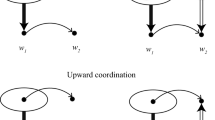Abstract
In strategic situations, agents base actions on knowledge and beliefs. This includes knowledge about others’ strategies and preferences over strategy profiles, but also about other external factors. Bernheim and Pearce in 1984 independently defined the game theoretic solution concept of rationalizability, which is built on the premise that rational agents will only take actions that are the best response to some situation that they consider possible. This accounts for other agents’ rationality as well, limiting the strategies to which a particular agent must respond, enabling further elimination until the strategies stabilize. We seek to generalize rationalizability to account not only for actions, but knowledge of the world as well. This will enable us to examine the interplay between action based and knowledge based rationality. We give an account of what it means for an action to be rational relative to a particular state of affairs, and in turn relative to a state of knowledge. We present a class of games, Epistemic Messaging Games (EMG), with a communication stage that clarifies the epistemic state among the players prior to the players’ actions. We use a history based model, which frames individual knowledge in terms of local projections of a global history. With this framework, we give an account of rationalizability for subclasses of EMG.
Similar content being viewed by others
Notes
She is separated from him by a big rock so he cannot see her but could hear her cries of pleasure.
The word belief is used here in a weak sense in which we can use it for non-linguistic creatures.
A puzzling question is how they passed the knowledge “it is a hoax” from one tiger to another. Tigers are solitary beasts and do not have cellphones.
We have not yet defined ‘rational’ so we will temporarily rely on an intuitive meaning of the word. A precise definition will be provided in the next section.
For 3 or more players, the set of rationalizable strategies may be strictly contained in the set of strategies that survive iterated elimination of dominated strategies, but for the purposes here the distinction is irrelevant.
This is not unlike the “sensitive knowledge” described by Locke [10], though we will avoid the epistemological questions about whether this constitutes true knowledge of the objective world or not. This model does take a track along the lines of empiricist conceptions of knowledge for the sake of simplicity of the model. As we have mentioned elsewhere, future work incorporating previously held knowledge is worthy of exploration. In addition to being a more general model, this would help to avoid philosophical issues of empiricism like those noted by Chomsky [4].
The \(R_i\) are often assumed to be equivalence relations and we shall follow this tradition.
References
Baltag, A., Moss, L. S., Solecki, S.: The logic of public announcements, common knowledge, and private suspicions. In: Arló-Costa, H., Hendricks, V., van Benthem, J. (eds) Readings in Formal Epistemology, pp. 773–812. Springer, Cham (2016)
Bernheim, B.D.: Rationalizable strategic behavior. Econom. J. Econome. Soc. 52(4), 1007–1028 (1984)
Chandy, K.M., Misra, J.: How processes learn. Distrib. Comput. 1(1), 40–52 (1986)
Chomsky, N., Ronat, M.: Language and Responsibility: Based on Conversations with Mitson Ronat. Pantheon Books, New York City (1979)
Dennett, D.: Intentional systems theory. Oxf. Handb. Philos. Mind 339–350 (2009)
Gerbrandy, J.D.: Dynamic Epistemic Logic. Institute for Logic, Language and Computation (ILLC), University of Amsterdam, Amsterdam (1997)
Gray, J.: Notes on database operating systems. In R. Bayer, R. M. Graham, and G. Seegmuller, editors, Operating Systems: An Advanced Course, Lecture Notes in Computer Science, Vol. 66. Springer, Berlin, 1978. Also appears as IBM Research Report RJ 2188 (1978)
Halpern, J.Y., Moses, Y.: Knowledge and common knowledge in a distributed environment. J. ACM 37(3), 549–587 (1990)
Lewis, D.: Convention: A Philosophical Study. Harvard University Press, Cambridge, MA (1969)
Locke, J.: An Essay Concerning Human Understanding. Kay & Troutman, Philadelphia (1847)
Parikh, R.: Recent issues in reasoning about knowledge. In: Proceedings of the 3rd Conference on Theoretical Aspects of Reasoning About Knowledge. Morgan Kaufmann Publishers Inc., pp. 3–10 (1990)
Parikh, R., Ramanujam, R.: A knowledge based semantics of messages. J. Logic Lang. Inform. 12(4), 453–467 (2003)
Parikh, R., Taşdemir, Ç., Witzel, A.: The power of knowledge in games. Int. Game Theory Rev. 15(04), 1340030 (2013)
Pearce, D.G.: Rationalizable strategic behavior and the problem of perfection. Econom. J. Econom. Soc. 52(4), 1029–1050 (1984)
Premack, D.: The codes of man and beasts. Behav. Brain Sci. 6(01), 125–136 (1983)
Rubinstein, A.: Modeling Bounded Rationality. MIT Press, Cambridge (1998)
Rubinstein, A.: Lecture Notes in Microeconomic Theory: The Economic Agent. Princeton University Press, Princeton (2012)
Savage, L.J.: The Foundations of Statistics. Courier Corporation, North Chelmsford (1972)
Sietsma, F., Van Eijck, J.: Message passing in a dynamic epistemic logic setting. In: Proceedings of the 13th Conference on Theoretical Aspects of Rationality and Knowledge, pp. 212–220. ACM (2011)
Simons, M.: Face Masks Fool the Bengal Tigers. The New York Times, New York (1989)
Van Benthem, J.: Games in dynamic? Epistemic logic. Bull. Econ. Res. 53(4), 219–248 (2001)
Van Ditmarsch, H., Van Eijck, J., Sietsma, F., Wang, Y.: On the logic of lying. In: van Eijck, J., Verbrugge, R. (eds) Games, Actions and Social Software, pp. 41–72. Springer, Berlin (2012)
Acknowledgements
We thank Hans van Ditmarsch, Sergei Artemov, Melvin Fitting, Olympia Hadjiliadis, and the attendees of the various workshops, seminars, and conference meetings at which this work has been presented for all of the helpful comments and suggestions.
Author information
Authors and Affiliations
Corresponding author
Additional information
Publisher's Note
Springer Nature remains neutral with regard to jurisdictional claims in published maps and institutional affiliations.
Rights and permissions
About this article
Cite this article
Stambaugh, T., Parikh, R. Knowledge, behavior, and rationality: rationalizability in epistemic games. Arch. Math. Logic 60, 599–623 (2021). https://doi.org/10.1007/s00153-021-00784-5
Received:
Accepted:
Published:
Issue Date:
DOI: https://doi.org/10.1007/s00153-021-00784-5




